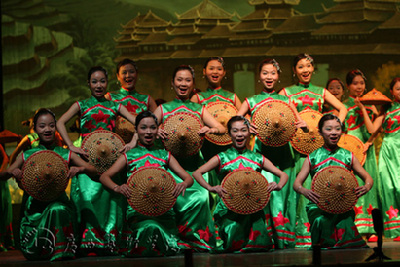
Singing
"Singing", referring to singing folk songs, is an important way of conveying feelings in daily life for the ethnic groups in Lingnan, especially Zhuang people. It can be best embodied in the saying, "Guangxi has become a sea of songs which were all composed by Liu Sanjie." Why is Guangxi renowned as a sea of songs? The reason is simply that the residents like singing very much.

Zhuang folk songs, the representative of Guangxi folk songs, can be divided into various types. They are about love, sisters, reunions and congratulations on birthdays and relocation.
At Ge Yu (a singing fair on the third day of the third lunar month) in the Zhuang ethnic group, young people show their talents, making polished impromptu songs and singing beautiful love songs in antiphonal style about affections, expressing wishes, awarding praise, the early period of a love affair, infatuation, showing fondness, taking an oath and saying farewell.
During the Chang Ha Festival (the singing festival of Jing people), Ha Ge (male singer) and Ha Mei (female singer) sing in chorus with the accompaniment of a single-string instrument.
In the Pan Wang Festival (the festival for Yao people to offer sacrifices to their ancestor Pan Wang), songs are as brilliant as the stars, including Pan Wang Ge (songs about offering sacrifices to Pan Wang), historical songs, love songs and songs about production.
During the Yi Fan Festival (the festival for Gelao people to celebrate harvest and pray blessing), singers sing Jing Shu (exhortatory songs), which are used for reclaiming the audience.
Songs are also indispensable to many other festivals of Guangxi ethnic groups, including Miao Festival (the festival for Maonan people to offer sacrifices to dragons), Zou Po Festival(the festival for Gelao people to sing songs and make friends), Duan Festival (the festival for Sui people to offer sacrifices to their ancestors), Hua Pao Festival (the festival for Dong people to scramble for firecrackers), Da Nu Festival ("Never forget the past" Festival of Yao people), Miao Nian (New Year Festival of Miao people), Lu Sheng Festival ("Hill climbing" Festival of Miao people) and Po Hui (the festival for Miao people to take part in recreational activities).
In daily life, Guangxi ethnic groups also love singing. For instance, they sing Jiu Ge (toasting song) when drinking; they sing Lan Lu Ge (songs of "Blocking the way") and Mao Fan Ge (songs of "Asking for food from the bride") when escorting the bride; they sing Ying Bin Ge (songs of "Welcoming guests") when greeting guests. There is a custom called Xing Ge Zuo Mei (singing love songs) for young men and women.
Most Guangxi ethnic groups can sing songs about almost everything during festivals. With special characteristics, the Dong chorus is hailed as "music from heaven". "Singing" is the first element of the Guangxi ethnic culture.